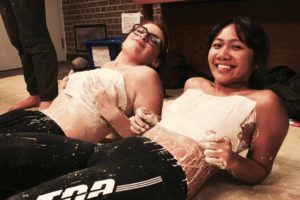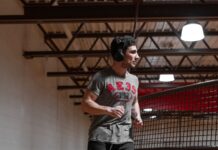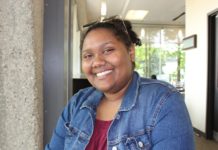by Harleen Kaur Dhillon & Charlotte Hings
Riley Cooper couldn’t see the beauty in her body until she saw her body as others see it. “I feel like I have a lot of like body issues and people around me are always trying to get me to love myself. But I never could really believe it until this experience of just being in touch with not just your body but like the beauty in my body and how unique it is. I love the idea of using your body for art and seeing the beauty in it,” the first-year urban planning student said.
Cooper went to one of the many events that were a part of UW Women’s Centre’s Love Your Body Week (LYBW) which took place over the week of Nov. 5 to Nov. 9. These events all dedicated to promote body positivity and loving your body.
The events included a Women in Arts Panel, Bust Casting, Felt Vulva craft night, and discussions about body politics and sex education. All of the events provided community and support for all participants.
“I feel like it was a very good experience to just hear about women who are actually in art talk about their experience,” Batt Batsaikhan, an Honours Science student, who attended the Women in Arts Panel, said.
“Even in my field, I can see the similarities of what they experienced with myself as well. Which I think is good, as a general like feminist thing, it’s good. It’s not just about arts, it’s about women.”
Women in Arts Panel
A panel of artists and curators from the UW community came together in the QNC to discuss topics ranging from the nature of art versus craft to the position of women in the art world to the colonization of museums and art. In addition, panelists spoke to the barriers they have faced to reaching success in the art world. Finally, they had some advice for budding artists in the room.
“There’s so many ways to get your art out there. One of the most important things to do is to trouble things in systems,” Joan Coutu, a faculty member in the Fine Arts Department of UW, said.
“I think a lot of people […] are all waiting for the moment that you are just fed up with everything and you’re not going to do anymore,” Soheila Esfahani, a Fine Arts graduate from and Studies in Islam lecturer in UW, said. “But I think that’s the moment that you should rise and […] participate and persist rather than stepping back all the time.”
Bust casting
The Glow Centre saw nearly 50 young women come in and apply plaster to their chests to create a cast of their breasts. A discussion about the stigmatization and experience of having breasts preceded the plastering. A safe space ensured that none of the women were sexualized and that everyone enjoyed themselves.
“I think for me it was really refreshing to hear a group of women talk so honestly about barriers in the art world because I think oftentimes, at least in my studies in fine arts in high school and in university, it’s something that isn’t necessarily as talked about in the classroom as much. I think creating events like this where there’s a space to openly talk about these things and address the issues that are going on is a really positive thing,” Jazlyn Pels, an Honours Science student said
The Sex Ed. You Wish You’d Had
The goal of this event was to destigmatize the topic of sex by debunking the most common sex myths with a game of Sex Myths Kahoot, a hands-on demo about how to make your own dental dam, and a Q&A session that allowed important sexual health questions to be discussed in a safe environment.
Body Politics
“One girl in the fifth grade told me that she posted on Instagram, a picture of her manicure, because she was really excited about it and someone told her that her fingers were fat, and then she shut down her instagram, ”Amanda Raffoul, a PhD Candidate in the School of Public Health and Health Systems, recounted.
Girls growing up under the influence of societal norms and values, are taught to equate their self-worth to the state of their bodies. They must be slender and small. The less space they take up, the more they will matter. “Among the general population there is an assumption that fat is bad, thin is good, in not only appearance-based senses, but also in a health related sense,” Raffoul said. This perception of obsetiy undermines a lot of the complex, physiological causes of obesity, that have nothing to do with personal character. The way obsesity and weight are portrayed in society has tremdous influence on the policies that work to tackle the issues. “We just keep telling kids in schools that they need to eat their vegetables[…] and we don’t provide anything to adress that complexity,” said Raffoul.
Felt Vulvas
A small gathering of participants in the Women’s Centre worked to create vulvas out of felt on Friday. Everyone unleashed their creative sides with clever sewing and stylistic talents. The common goal of making the vulvas allowed for open discussion on various topics among the participants as well as an opportunity for learning new skills.
“I like that it’s a little community where you feel safe and it’s all just like women supporting women,” Batsaikhan said.































